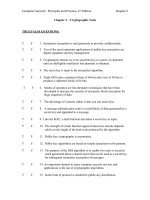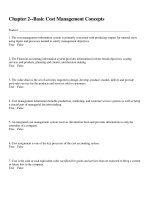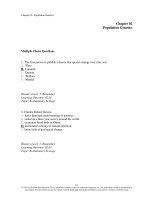Nursing leadership and management 2nd edition kelly test bank
Bạn đang xem bản rút gọn của tài liệu. Xem và tải ngay bản đầy đủ của tài liệu tại đây (179 KB, 6 trang )
Chapter 2-BASIC CLINICAL HEALTH CARE ECONOMICS
MULTIPLE CHOICE
1. The purpose of analyzing records of what transpires in hospitals is to practice financial stewardship
and determine whether it is, in fact, doing good or producing “mischievous outcomes.” Which of these
authors made this comment?
a. Laura Nosek
b. Ida Androwich
c. Pat Kelly-Heidenthal
d. Florence Nightingale
ANS: D
RAT: Health care economics is grounded in past values and culture. Nearly 150 years ago, Florence
Nightingale recognized that the resources being used to care for sick people ought to be tracked and
analyzed to improve clinical and business outcomes. Laura Nosek and Ida Androwich are the authors
of the chapter, Basic Clinical Health Care Economics. Pat Kelly-Heidenthal is the author of the
textbook Nursing Leadership and Management.
PTS: 1
REF: p. 44
BLM: Remembering
2. The study of economics is based on three premises. Which of the following is one of those premises?
a. abundance of resources
b. a single product to produce
c. scarcity of resources
d. consumers’ ability to pay
ANS: C
RAT: The study of economics is based on three general premises: (1) preference of consumers and
societal values; (2) scarcity of resources and demand greater than supply; and (3) choice about which
resources to produce.
PTS: 1
REF: p. 44
BLM: Understanding
3. What is the term for the price that a consumer is willing to pay for a service or product?
a. cost price
b. buyer price
c. payer price
d. price elasticity
ANS: D
RAT: Price elasticity is related to the price that a consumer is willing to pay for a given item. Health
care is much less elastic with reference to price than many other consumer goods. The cost is the price
paid or to be paid for something. The actual payer of health care is the third-party (insurance company
or government) who will reimburse the provider.
PTS: 1
REF: p. 44
Copyright © 2013 Nelson Education Ltd.
BLM: Remembering
2-1
4. What is the term for unselfish concern for the welfare of others?
a. ethics
b. altruism
c. egoism
d. paternalism
ANS: B
RAT: Altruism is the unselfish concern for the welfare of others. Ethics is the doctrine that the general
welfare of society is the proper goal of an individual’s actions. Egoism is the tendency to be
self-centred or to consider only oneself and one’s own interests. Paternalism is a practice often
associated with male authority that makes decisions on others’ behalf, assuming others are less
capable. Health care has traditionally been governed and controlled by physicians and the medical
profession which historically has been male dominated. Command of specialized, scientific knowledge
and skills, which required extensive education, gave medicine a unique mystique and power.
PTS: 1
REF: p. 45
BLM: Understanding
5. Which of the following statements best describes a comparison of the health care systems in Canada
and the United States (U.S.) 40 years ago?
a. The U.S. relied on government programs; Canada relied on private insurance.
b. Canada had universal health care; the U.S. relied on charity.
c. No significant difference existed between the two systems.
d. Canada and the U.S. both had publicly financed health insurance.
ANS: C
RAT: Approximately 40 years ago the health care systems in both Canada and the U.S. functioned in
the same way. People paid for health care directly or relied on private health insurance if they could
afford it. Since the early 1970s Canada has provided its citizens with universal access to health care
through public health insurance. The U.S. has some public health care programs but continues to rely
heavily on private insurance. Currently more than 40 million Americans are uninsured.
PTS: 1
REF: p. 45
BLM: Understanding
6. What percent of Canada’s Gross Domestic Product (GDP) was spent on health care in 2010?
a. 2 percent
b. 5 percent
c. 12 percent
d. 25 percent
ANS: C
RAT: According to Statistics Canada, in 2010, 12 percent of Canada’s GDP was dedicated to health
care spending. This represented a moderate increase over 1992 costs. Concern over rising costs
resulted in a number of health reform initiatives.
PTS: 1
REF: p. 46
Copyright © 2013 Nelson Education Ltd.
BLM: Remembering
2-2
7. Which of these member countries of the Organization for Economic Cooperation and Development
(OECD) is ranked number two in terms of overall performance while being relatively low in cost?
a. Canada
b. United Kingdom
c. Japan
d. France
ANS: C
RAT: A comparison of the performance of health systems in OECD countries for 2010 ranked Japan
second, with its high ranking on life expectancy and other positive factors, while having the second
lowest expenditures as percent of GDP. The United Kingdom ranked 19th, France 6th place, and
Canada was ranked 7th.
PTS: 1
REF: p. 46
BLM: Analyzing
8. Which of the following is a major federal government report commissioned to examine the quality,
cost, and future of health care in Canada?
a. the Fyke Report
b. the Mazankowski Report
c. the Clair Report
d. the Romanow Report
ANS: D
RAT: The Romanow Report was the report of the federal Commission on the Future of Health Care in
Canada, 2002. The report was formally titled Building on Values, the Future of Health Care in
Canada. The Fyke, Mazankowski, and Clair reports each examined and provided recommendations for
health reform in the provinces of Saskatchewan, Alberta, and Québec, respectively.
PTS: 1
REF: p. 48
BLM: Understanding
9. Which of these terms do citizen involvement, accreditation and credentialing, and complaints
procedures exemplify?
a. performance indicators
b. stakeholder involvement
c. accountability processes
d. managerial functions
ANS: C
RAT: Accountability processes include citizen involvement, accreditation and credentialing, and
complaints procedures. Stakeholder involvement is important to ensure accountability, and their
identity determines their relationship and role in the accountability process. Managerial functions are
another type of accountability process that can involve the use instruments such as program
evaluations, quality assurance, and performance indicators.
PTS: 1
REF: p. 48
Copyright © 2013 Nelson Education Ltd.
BLM: Analyzing
2-3
10. What is meant by the function of “financing” in relation to the health care system?
a. private insurance coverage
b. sales taxes
c. how health care is paid for
d. equalization payments
ANS: C
RAT: The financing of the system refers to how health care is paid for. In Canada the public health
care system is financed through taxes such as personal income tax and sales taxes at both the federal
and provincial levels. The federal government assists the provinces in financing health care by
transferring funds back to them. The less wealthy provinces also receive equalization payments from
the federal government which can be spent according to their own priorities.
PTS: 1
REF: p. 50
BLM: Understanding
11. What is the term for the way provinces and territories pay their health care providers?
a. physician remuneration
b. fee-for-service
c. the delivery function
d. the funding function
ANS: D
RAT: The way in which health care providers are paid is called the funding function. The main form
of funding or remuneration for physicians is fee-for-service. The delivery function refers to the method
used to provide health care services.
PTS: 1
REF: p. 50
BLM: Understanding
12. Through what mechanism do most regions receive funding from their provincial government?
a. a needs-based funding formula
b. a program budgeting and marginal analysis (PBMA)
c. a global budget
d. program budgets
ANS: C
RAT: In most provinces the health regions are funded through a global budget. The amount of the
global budget allocation is determined by regional assessment and a needs-based funding formula.
Program budgets are one component of the global budget. PBMA is a strategy that links physician
knowledge and expertise into organizational decision-making processes for matters such as
determining budgets and spending priorities.
PTS: 1
REF: p. 50
Copyright © 2013 Nelson Education Ltd.
BLM: Understanding
2-4
13. Which strategy is included in financial reform for health care in Canada?
a. de-insuring certain services
b. introducing co-payments
c. charging some user fees
d. extending the use of fee-for-service to other providers
ANS: A
RAT: Some provinces have de-insured some services such as routine eye exams or elective procedures
such as circumcision, so these are no longer covered. Co-payments and user fees are not an option at
this time as they are contrary to the principles of the Canada Health Act. Physician remuneration is the
second highest expenditure in health care. The current model of mainly fee-for-service tends to lead to
higher use of primary care services, higher client volumes but shorter time spent with each client.
Much attention is being paid to consideration of other payment options such as annual salaries and
capitation.
PTS: 1
REF: p. 52
BLM: Understanding
14. Which of these systems has replaced in-house costing in many Canadian hospitals?
a. case-costing
b. resource benchmarking
c. resource intensity weights (RIWs)
d. activity-based costing (ABC)
ANS: C
RAT: RIWs have replaced many individual in-house costing systems. They have been calculated by
the Canadian Institute of Health Information are used to better understand the costs associated with
client care. Case-costing is a way of operationalizing activity-based costing (ABC) as a method of
managing accounting information in health care. Resource benchmarking is related to the objective of
determining average resource consumption for particular clinical cases and the associated costs.
PTS: 1
REF: p. 56
BLM: Remembering
15. What is the main strategy associated with discussions about reform in health care delivery?
a. increasing the reliance on private insurance
b. changing the taxed-based funding arrangement
c. privatizing
d. implementing user fees
ANS: C
RAT: The most frequently debated strategy related to reform in health care delivery is increased use of
privatization in some form. Changes to tax-based financing have not been recommended by most of
the recent commissions and reports such as the Romanow and Kirby reports. Increased reliance on
private insurance has also not been a widely supported strategy. User fees for insured services cannot
be considered as a reform strategy as they contravene the principles of the Canada Health Act.
PTS: 1
REF: p. 56
Copyright © 2013 Nelson Education Ltd.
BLM: Understanding
2-5
16. To which of the following does the term P3 refer?
a. public-private partnerships
b. for-profit services
c. out-of-pocket payments
d. private insurance
ANS: A
RAT: P3s refer to public-private partnerships which involve contracts between the public sector and
private sector investors, for-profit ancillary service, or client care providers. Out-of-pocket payments
or user fees for insured services would still be disallowed under the terms of the Canada Health Act
and the role of private insurance would not be affected. Some provinces such as Québec and Alberta
have entered into P3 contracts. In Québec the private involvement in major hospital construction was
scaled back to better ensure public control.
PTS: 1
REF: p. 57
BLM: Remembering
17. Which of these statements best describes the outcome of health reform strategies such as the
restructuring, outsourcing, right sizing, and merging of the past 20 years?
a. Costs are no longer a major concern.
b. Many costs have been reduced.
c. Costs have been contained.
d. The overall cost of health care continues to grow.
ANS: D
RAT: Despite some short-term savings and slowing of the rate of increase, the overall cost of health
care delivery continues to grow. Over the past two decades provincial, territorial, and the federal
governments have struggled to find ways to continue to deliver high quality, accessible health care
while controlling costs.
PTS: 1
REF: p. 57
BLM: Understanding
18. Which of the following factors is NOT expected to contribute to the growing cost of health care?
a. increasing rates of debilitating diseases associated with aging
b. increased use of expensive technology
c. emergence of new infectious diseases
d. expanded roles for nurses
ANS: D
RAT: The trends expected to contribute to growing costs in health care are lengthening of survival
rates from some infectious diseases resulting in longer life expectancy; increased rates of the
debilitating diseases of aging; new infectious diseases such as AIDS and Ebola that require expensive
long-term treatment, and the availability of complex and costly technologies. Expanded roles for
nurses has not been identified as a contributing factor.
PTS: 1
REF: p. 57
Copyright © 2013 Nelson Education Ltd.
BLM: Analyzing
2-6









